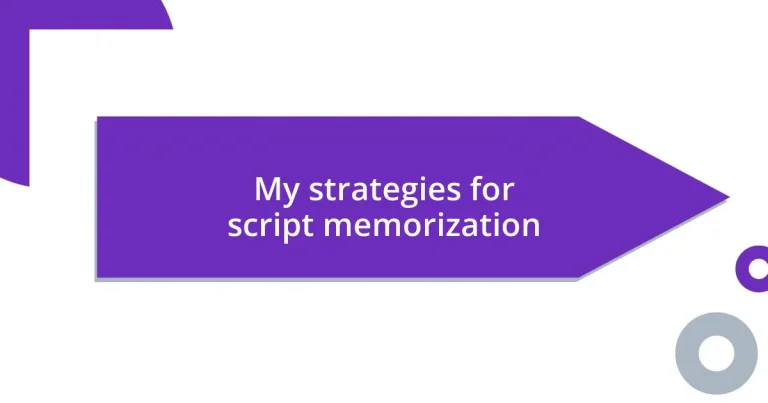Key takeaways:
- Memorization enhances performance by boosting confidence and enabling authentic audience connection.
- Utilize diverse techniques such as chunking, visualization, and active recall to improve line retention.
- Manage anxiety with breathing exercises and creating a comfortable study environment for effective memorization.
- Review and refine skills through mind mapping, recording rehearsals, and regular self-assessment to deepen understanding.
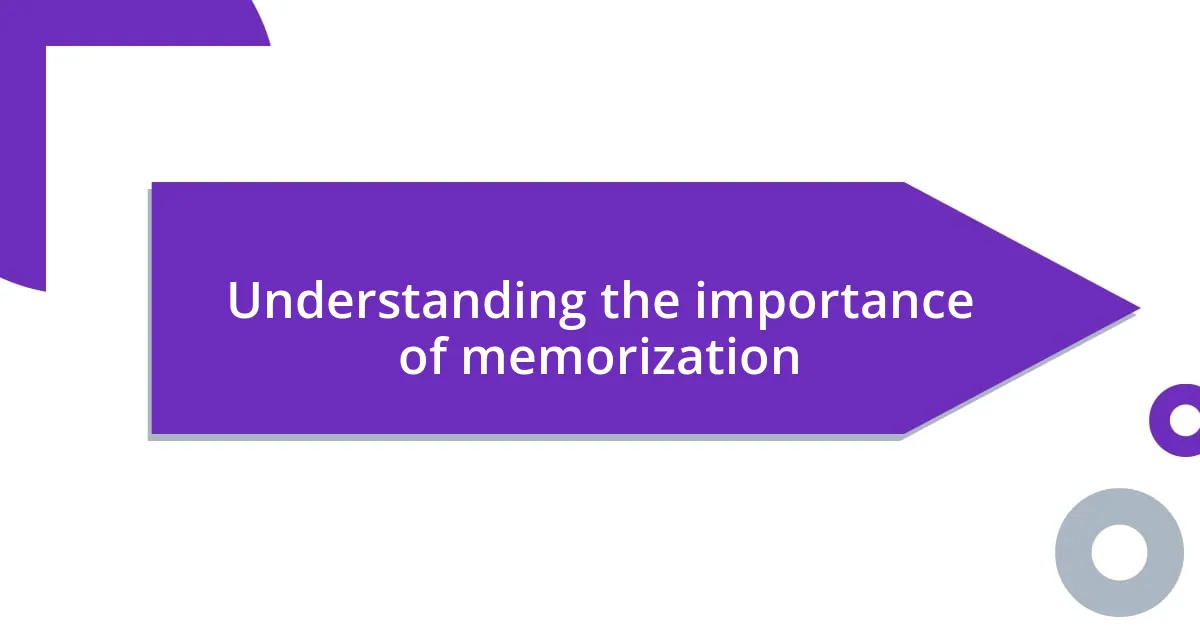
Understanding the importance of memorization
Memorization is a cornerstone of effective script delivery, something I’ve come to appreciate during my own experiences. For instance, I remember the first time I performed without my notes—I felt a rush of adrenaline and freedom that made the lines flow naturally. It struck me then: without memorization, you not only risk forgetting your lines but also lose the chance to connect authentically with the audience.
Think about it—how often have you watched a performer stumble over lines? It’s uncomfortable for everyone involved! I once experienced this firsthand while waiting backstage, feeling my heart race as I watched a fellow actor grapple with their script. In that moment, I understood how vital memorization is; it gives you the confidence to engage and improvise on stage, creating a dynamic experience for both the performer and the audience.
Moreover, memorization fosters deeper understanding and emotional connection with the material. When I truly internalize a script, each line resonates with me—like a song that sticks in your head long after you’ve heard it. Have you ever noticed how a well-memorized performance can evoke genuine emotions? It’s a powerful reminder of the impact that solid memorization can have, turning lines into heartfelt expressions.
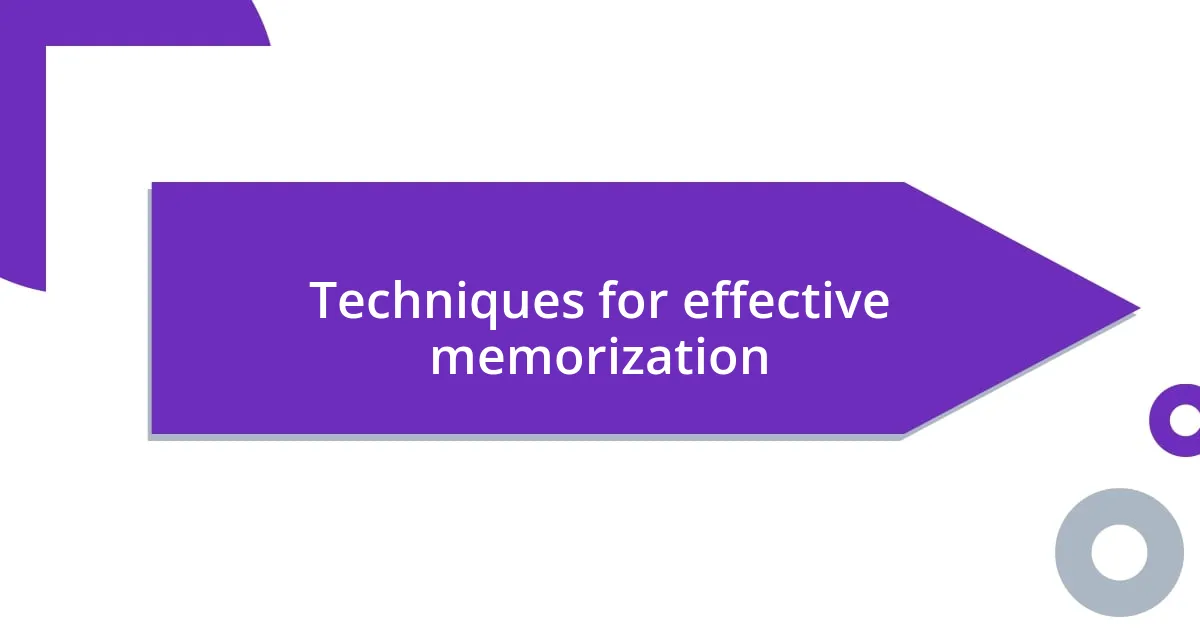
Techniques for effective memorization
When it comes to memorization, I find that utilizing a mix of techniques can really amplify your ability to recall lines. For me, breaking down the script into manageable chunks was a game changer. It’s like tackling a daunting puzzle; when I focused on one piece at a time, I felt less overwhelmed and more in control. Repetition is also key; I’d recite my lines aloud, sometimes even acting them out in front of a mirror, which helped cement the words in my mind.
Here are some techniques that I’ve consistently found effective for memorizing scripts:
- Chunking: Break down your script into smaller sections. It makes it easier to memorize.
- Visualization: Create a mental image associated with the lines. This personal touch makes the words more memorable.
- Association: Link lines to specific emotions or personal experiences. I often connect a line to a moment from my life, which makes it stick.
- Rehearsal: Practice your lines in varied settings. Shifting environments can enhance recall.
- Recording: I’ve found recording myself reading the script and listening to it helps reinforce memory. It’s like having a private rehearsal!
Connecting with the material emotionally transforms the words into something more profound for me. I remember a scene where I needed to portray deep sadness; imagining a personal loss brought that vulnerability to life, making the lines easier to memorize. It’s not just about the words; it’s about the feelings and experiences we internalize that truly anchor them in our minds.
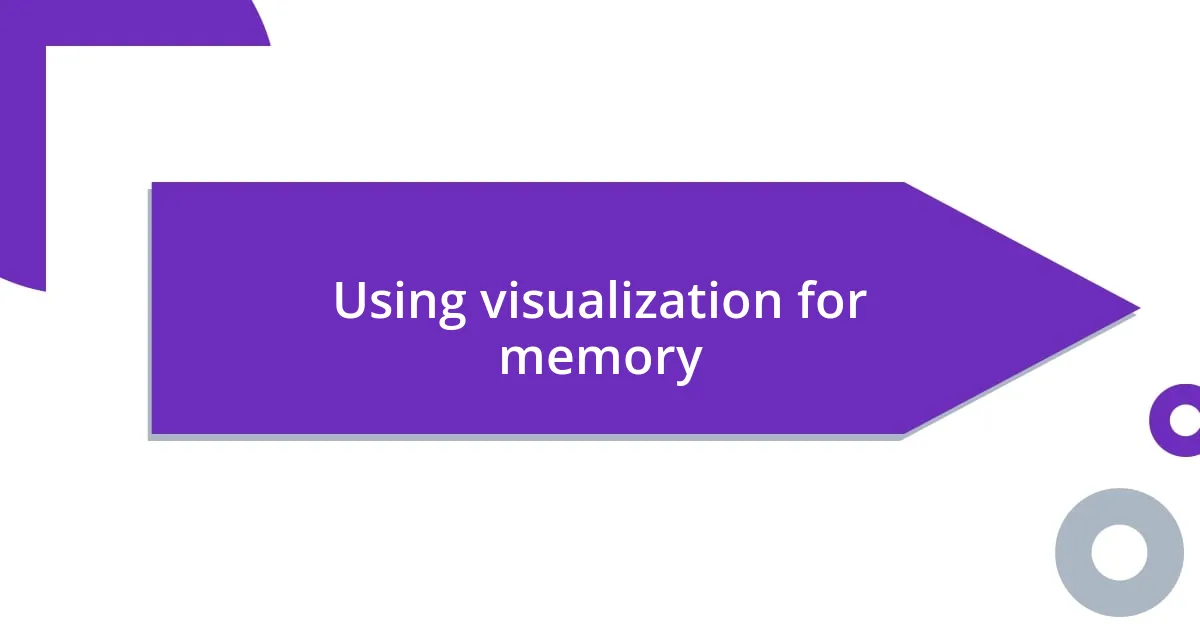
Using visualization for memory
Using visualization in memory techniques has been an enlightening journey for me. I remember one rehearsal where I envisioned the setting of my scene in vivid detail—every color, sound, and feeling became a part of my mental landscape. This imaginative technique transformed my lines into a story I could see unfolding in my mind. It wasn’t just text on a page; it became a living scenario, making memorization feel more like storytelling and less like rote learning.
Another powerful aspect of visualization is that it taps into my emotions. For instance, when I visualize a scene with the intensity of emotion I need to convey, I find it easier to remember the lines. There was a moment in a dramatic piece where I pictured my character standing in a storm, both physically and emotionally battered. Every time I recalled those lines, I not only remembered the words, but I also felt the weight of that moment, anchoring the dialogue in my heart and mind. This emotional connection through imagery has been a game changer for me.
Creating a vivid mental picture, I’ve noticed, helps me forge a deeper link to my lines. The blend of sights, sounds, and feelings allows information to become multidimensional in my memory. I often use this technique before I go on stage. I visualize the audience, the stage, and even my character’s journey, so when the lights come up, I’m not just reciting lines; I’m stepping into a scene where everything feels real to me.
| Technique | Description |
|---|---|
| Visualization | Create mental images associated with lines to enhance recall. |
| Emotional Connection | Link lines to personal feelings or experiences for a deeper understanding. |
| Multidimensional Memory | Incorporate various senses to turn lines into a vivid scene. |
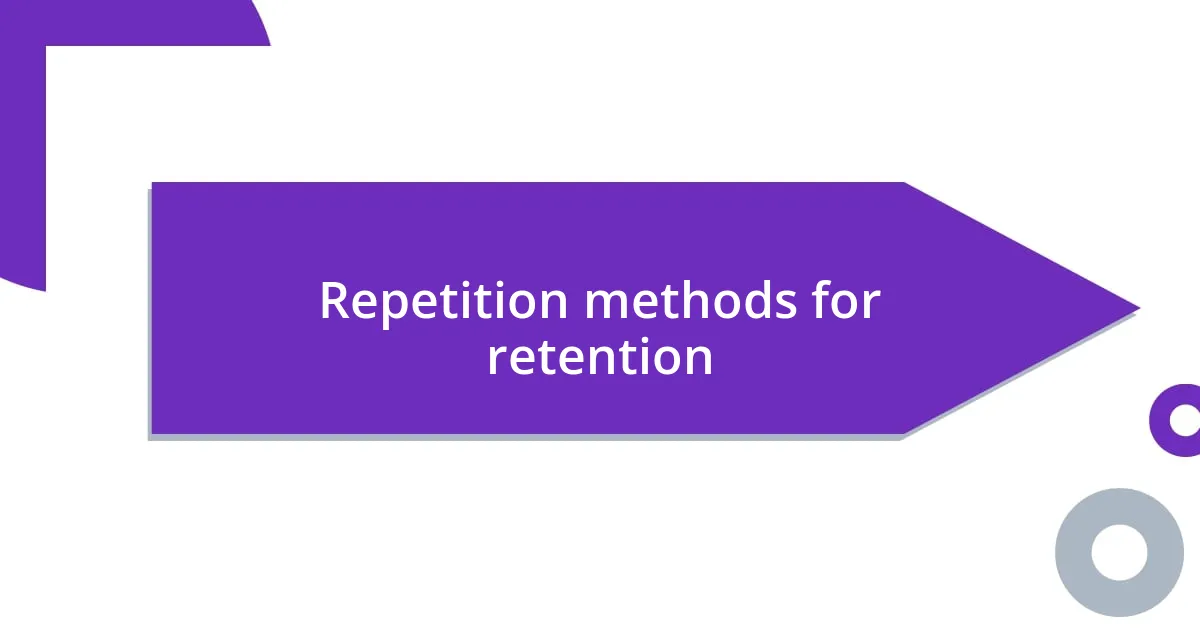
Repetition methods for retention
I’ve really found that repetition methods can transform how I internalize my scripts. One technique that always stands out to me is the classic “write it out.” After reading a line a few times, I take a notebook and write it down. Something about the act of physically writing reinforces my memory. Have you ever tried it? I remember sitting at my kitchen table, pen in hand, frantically jotting down my lines the night before a big performance. It was almost therapeutic. The more I wrote, the more the words began to feel like my own.
Reciting lines at different times of the day has also worked wonders for me. In the morning, I’d read my lines while sipping coffee, then again in the evening while cooking dinner. What’s interesting is that this variety not only makes the memorization process feel less monotonous but also allows the words to settle in my subconscious. There have been times when I’ve surprised myself by smoothly recalling a line while washing dishes! It’s a delightful reminder that repetition doesn’t always have to be tedious; sometimes, it can creep into your everyday life in the most unexpected ways.
Another approach I often use is to practice with a partner. I recall one rehearsal where my friend and I would sit in a park, tossing lines back and forth while enjoying the fresh air. It’s incredible how that social aspect adds layers to my memory. Engaging in dialogue not only made the experience light-hearted and fun, but it also forced me to stay present and sharp with my lines. Isn’t it fascinating how we can combine repetition with interaction to bolster retention? Each time I’m able to perform without a hitch, I feel a sense of camaraderie with my fellow cast members, all thanks to those repetitive yet blissful exercises together.

Incorporating active recall strategies
Incorporating active recall strategies has been a revelation in my memorization journey. Specifically, using flashcards can really sharpen memory retention. I remember creating a set of cards featuring key lines and cues, then randomly tested myself throughout the day. There’s something incredibly satisfying about the “aha” moment when I can retrieve a line without looking. Have you felt that rush when you realize you’ve committed something meaningful to memory?
Another technique I cherish is the use of spaced repetition. This method involves reviewing the same material multiple times over increasing intervals of time. I’ve had nights when I’d review my lines before bed and then test myself the next morning. It encourages that memory to linger in my mind longer, transforming it from something I merely read to something I truly own. It’s like training for a marathon, where each session builds upon the previous one, creating a stronger foundation.
Lastly, practicing under simulated conditions can enhance recall significantly. I recall staging mini performances for trusted friends on a whim. The pressure of performing as if it’s the real deal forces me to dig deep for the lines, reinforcing them in my brain. Does it remind you of the exhilaration of live performances? That adrenaline rush pushes me to engage more fully with my script, transforming each session into a memorable experience instead of mere practice.
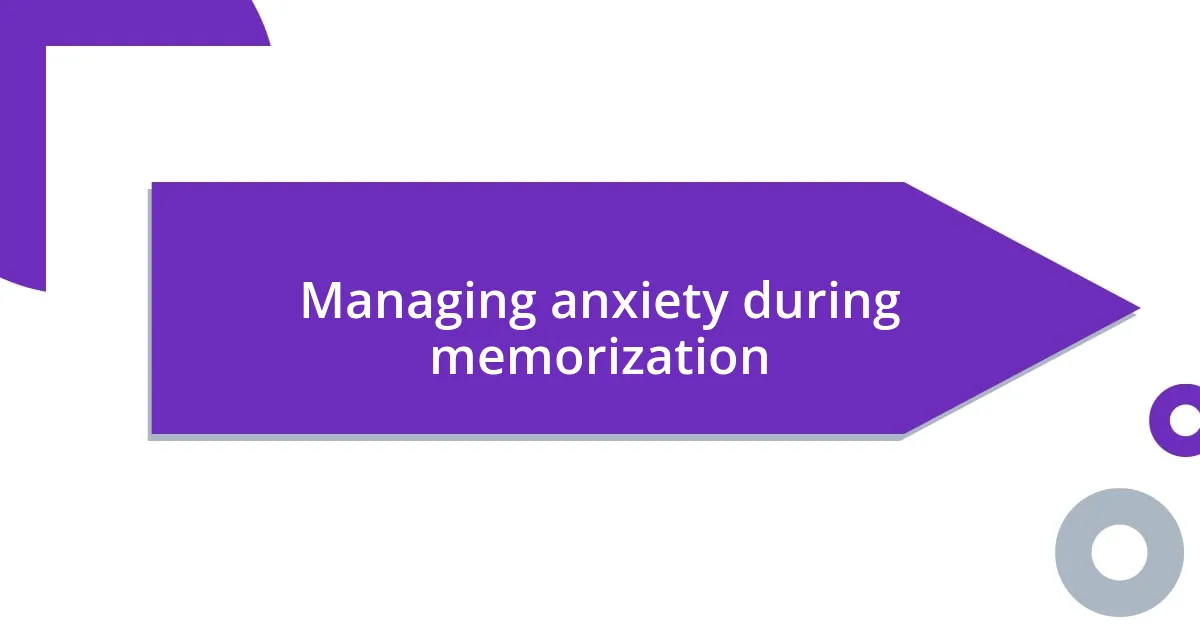
Managing anxiety during memorization
Anxiety can often sneak in during the memorization process, making it challenging to focus. I’ve experienced it firsthand while trying to nail down a lengthy monologue. When those nerves strike, I find that taking a few deep breaths can do wonders. It’s as if I’m pressing a reset button in my mind, calming those racing thoughts. Have you ever noticed how just a moment of stillness can shift your focus back to the task at hand?
Another tactic that really helps me is physical movement. Whether it’s a short walk or some basic stretching, incorporating movement can release built-up tension. I vividly remember pacing my living room while mouthing my lines aloud, feeling each word resonate as I moved. The anxiety melted away with each step, allowing the words to flow more naturally. It’s amazing how our bodies and minds are intertwined in these moments.
Lastly, creating a comfortable space for memorization can significantly ease my anxiety. I like to arrange my study area in a way that feels inviting, with soft lighting and a warm cup of tea nearby. It’s interesting how our environment can impact our mindset. In those cozy spaces, I often find myself immersed in my script, free from distractions. Have you ever rearranged your surroundings and felt an instant lift in your mood and concentration? When I make that effort, it feels like I’m setting the stage for success, both literally and figuratively.
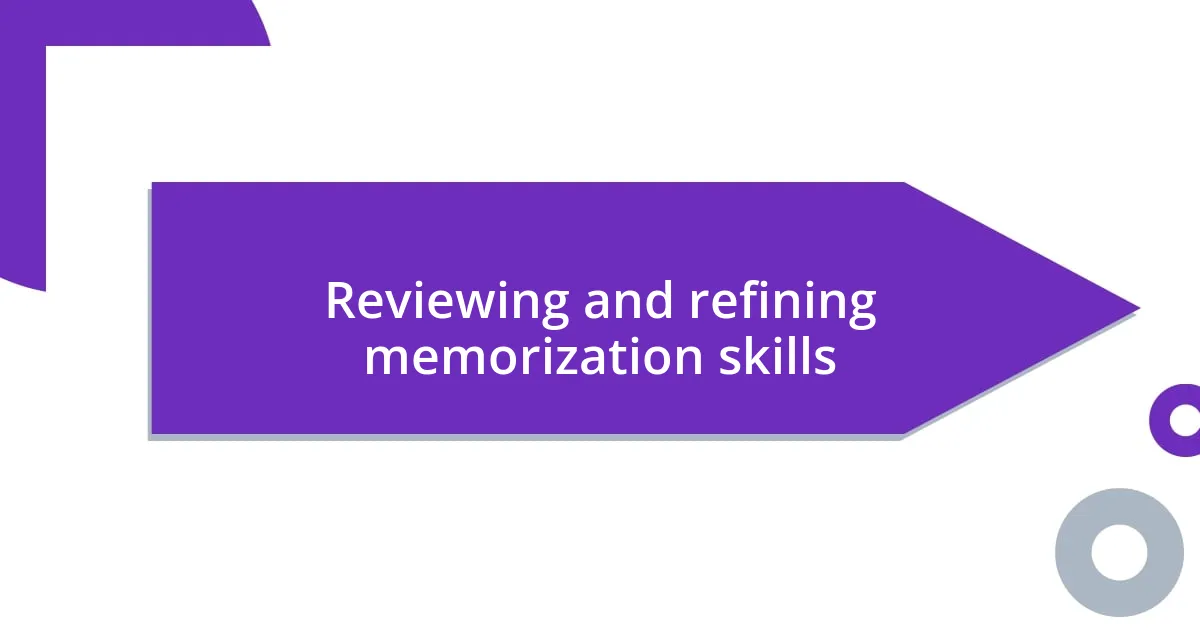
Reviewing and refining memorization skills
One effective way I’ve found to review and refine my memorization skills is through the concept of “mind mapping.” When I map out the emotions and motivations behind each line, it adds depth to my understanding. I once created a colorful mind map for a particularly emotional scene, connecting each line to different feelings and backstories. It was fascinating to see how visualizing the relationships between lines transformed my memorization process. Have you ever tried mapping out your thoughts visually?
Another approach that’s been invaluable in fine-tuning my memory is recording myself. I’ve spent countless hours listening to recordings of my lines, sometimes during mundane activities like doing the dishes. Hearing my own delivery allowed me to catch nuances I might’ve missed and solidified the words in my mind. It’s almost like having a conversation with yourself. How cool is it to think that your voice can become a powerful tool in memorization?
Lastly, I advocate for regular self-assessment. Periodically, I set aside time to quiz myself on the script, noting any lines that trip me up. I embrace those challenges as indicators of what to focus on next. One time, I was certain I had every line locked down, only to blank during a self-test. That humbling moment reminded me that continuous refinement is key. Have you had that experience where you realized that practice is an ongoing journey? Embracing these moments has helped me grow profoundly in my memorization journey.












